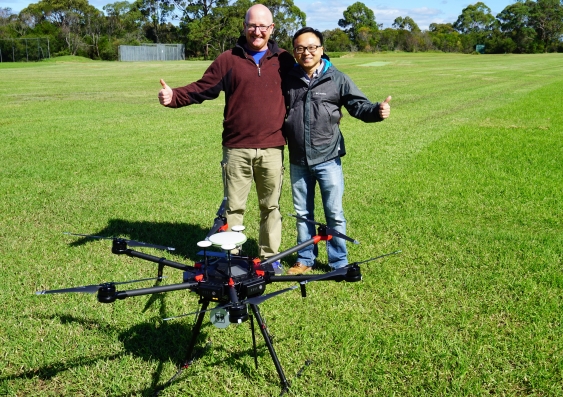Autonomous 3D mapping drone is a game changer
UNSW researchers have helped develop an autonomous 3D mapping drone that slashes surveying times and has the potential to save lives, cut costs and even assist in disaster recovery.
UNSW researchers have helped develop an autonomous 3D mapping drone that slashes surveying times and has the potential to save lives, cut costs and even assist in disaster recovery.

Danielle Neale
0481 451 636
danielle.neale@unsw.edu.au
An autonomous 3D mapping drone that slashes surveying times from weeks to hours has the potential to save lives and cut costs in many industries, as well as assist in disaster-recovery efforts.
UNSW Engineering researchers and Linke & Linke Surveys have partnered to develop the Unmanned Aerial Vehicle (UAV) using spinning Light Detection and Ranging (LiDAR) technology that delivers fast and accurate 3D maps of targeted areas and features. Weighing about 12 kilograms, the small UAV can travel for up to 18 minutes above any terrain to deliver data from 30,000 reference points per second in real time.
One of its main surveying uses is in large construction projects, where large costs are derived from measuring stockpile volumes and waiting for accurate data.
James Linke, director of Linke & Linke Surveys, said the UAV cut data capturing times dramatically. "The cost savings would be in the region of 3,000 per cent, compared with a job being done by one person," Mr Linke said. "If you have three or four kilometres of stockpiles, it might have taken five to 10 days [to measure]. Now it can be done in 10 minutes, and you have the data ready to use instantaneously.
"After a 10-minute flight, you can have a point cloud that covers the whole site and is available in real time. This technology is going to dramatically change the way construction is done in Australia."
The partnership recently received a $15,000 grant through TechConnect, a UNSW incubator program that supports small to medium-sized businesses to develop innovative technologies on campus. The program is funded by the NSW Department of Industry's $12 million Boosting Business Innovation Program.
The UAV is still at the prototype stage, though the partnership team can already see many applications beyond the construction industry. One is asset mapping – being able to assess with centimetre accuracy where specific features or items might be, such as an energy company auditing the position of its powerlines. Another is in the mining industry.
Research leader Dr Johnson Xuesong Shen, Lecturer from UNSW's School of Civil and Environmental Engineering, said the UAV could help the coal-mining industry keep its workers safe.
"We have a research project at the moment looking at the safety of open-pit coal mining," Dr Shen said. "[With the UAV] we can map out the high wall, do some analysis and figure out the risk of collapse."
Mr Linke said the UAV allowed surveying jobs to be done not only faster and cheaper, but also much more safely. "You can take a drone and fly it where you can't send a human surveyor, and easily bring it back," he said. "This is especially in situations like disaster relief, where there's a need for real-time data capture."
Mr Linke said speed was becoming a crucial element of success in engineering. "[The UAV] allows you to present data to the engineering team so that they can plan resources," he said. "Engineering is moving now towards real-time reporting. Information that's two days or two weeks old is not as valuable or useful."
Launched earlier this year, TechConnect provides grant recipients with co-working space, support and access to campus facilities.
"This initiative has an important role to play in taking our technology to the world," said Professor Ian Gibson, Associate Dean of Industry and Innovation at UNSW Engineering. "It's very much aligned with our 2025 strategy to ensure we deliver real impact through our academic excellence."
Dr Shen said TechConnect's investment was valuable for researchers and their partners. "With the support of this grant, we can do more research and speed up any commercial applications," he said. "We can also look at the future development of the technology."
The 3D mapping UAV will be on display at B2B technology exhibition CeBIT Australia, which runs from May 23-25 at the International Convention Centre in Sydney.
TechConnect is holding a "Meet & Greet Researchers at UNSW" networking event on 9 June 2017. Industry partners will be invited. UNSW Researchers are encouraged to register at Empower Session Two. For more information about TechConnect, visit the website.